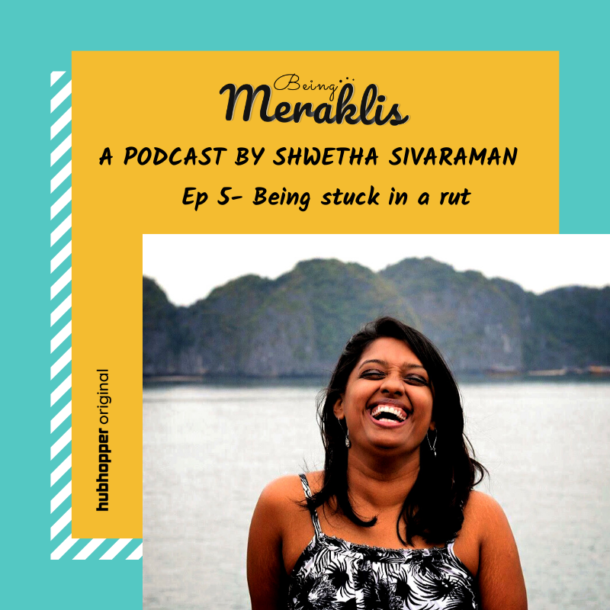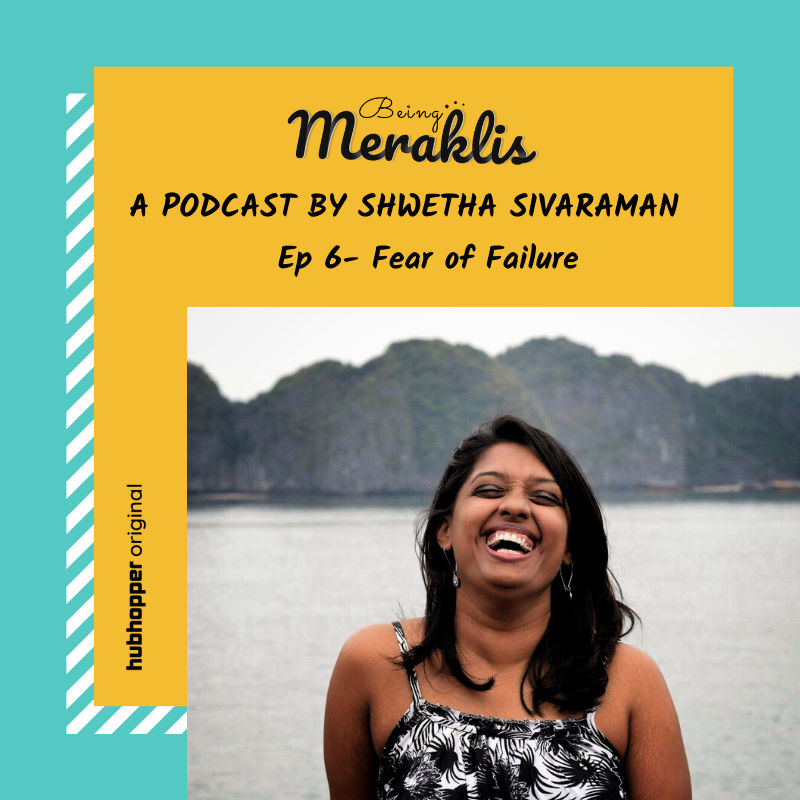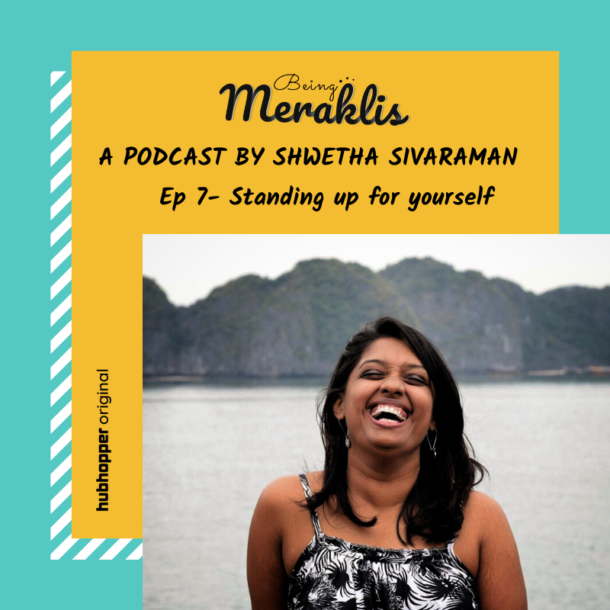
Episode 6 – Fear of Failure
 Hello and welcome back to Being Meraklis a podcast by Shwetha Sivaraman.
Hello and welcome back to Being Meraklis a podcast by Shwetha Sivaraman.
How are you all this week? I had a good week after several crazy ones, I paced myself at work, got a lot more done instead of running around in a frenzy. I am recording this podcast in the middle of a friend’s wedding in Kolkata, but I hope this is worth it.
If you remember I had done a quick survey last week on Instagram and a lot of you had shared your responses.
In today’s podcast I want to talk about the first topic request I received through this feedback – Fear of Failure.
Fear can come in many forms and shapes. Debilitating at it is in its core, it originates from something we are threatened of – It could just an intangible thought or an actual danger, but it is still real for us. Healthline lists a total of 115 failures in its A-Z list of phobias.
But of them all, I think the notion of “Fear of Failure” has to be the most challenging.
Quoting a psychologist
“Fear of Failure is where the prospect of failing presents such a significant psychological threat, motivation to avoid it exceeds the motivation to succeed.”
We have all faced that. The trigger could be subjective from person to person, but the consequence is the same. It immobilizes you. Like a freeze spell. It stops you from making a move. Fear has a grip on you like no other, it can hold you back from doing things you want to achieve, force you to stick to the well-trodden path. The path that the mind is well-versed with rather than tread the unknown.
It manifests in different ways
Endless procrastination – Tomorrow becomes day after, and the day after never comes. We put it off for another day rather than confront difficult situations.
Perfectionism – We shove all our anxieties and worries and try to fool the world and ourselves saying we are trying to make it perfect and that you are not ready as yet.
Make excuses and hold yourself from back from opportunities. We stick to what we are sure of and avoid trespassing boundaries
What others will think – We wonder what others might think, say, and comment. Or are afraid of disappointing them
Set expectations before doing a task to lower expectations “I have not played in a while” “This is my very first attempt in front of such a large audience” “I am not very used to doing this, do not expect much” “I will try, but no promises” Excuses so as not to let down people.
But most dangerous of all – is that fear of failure causes inaction. We would rather do nothing than walk the plank and face our own demons.
Fear of failure could be triggered by a similar event in the past or just the fear of uncertainty in the future.
I have been under this spell on countless occasions myself. But let us first deal with fear of failure that comes from past experiences.
As a teenager growing up, I was pretty much not associated with a single tribe, so I could not afford making a fool out of myself. I had trained myself to be sure everything looked perfect from the outside. What would they think if I did this or said that?! I was scared of being laughed at. So slowly things that I was not sure of used to keep getting omitted – Out of sight out of mind right?
Butterflies in my stomach speaking in front of large audiences, no more public speaking. Choked playing a character in a play, no more theater for you. And so, the trimming happened, and safe mode was all I played in. Stuck to well-trodden paths, venturing into what was proven and done before as right. But the pressure started building up, the gap between the life I wanted to live and the life fear made me lead widened, until it stopped making sense.
Think about it for a minute, your biggest failure in your life. The moment where you felt deeply humiliated or ashamed or felt like you let yourself down– replay that incident slowly in your mind, if possible, or better yet jot it down. Write everything you can remember about the incident – right down to what color dress those around you were wearing that day. You’ll be surprised by how much detail you will remember of this incident irrespective of when it happened to you.
Do not stop the flow of thoughts in this process – Literally pour every single thing you remember, ever single thing you felt, every single thing people told you then, the consequences, the repercussions and its impact till today on the paper.
Pause here if you need a moment `to collect your thoughts on this, before listening to the rest of the podcast.
Alright, here is sincerely hoping this exercise took you lesser time than me. I did this exercise long back and it had gone on for a whole week. Not kidding. So now that you have it in front of you the biggest failure you have faced in your life till date. Read it once again, and do not dismiss or disregard any feelings that come up. When you think you are ready, objectively bucket them into 2 categories – What actually happened and What meaning you have assigned to it.
Once you do this exercise religiously you will find that what actually happened was barely 2 or maybe 3 bullet points, but the bucket of the meaning you have assigned to it runs into pages. We tell ourselves stories about what happened, attach meaning to it, reanalyze it, and butcher the truth. Every re-run of the incident adds more layers to the reality. And the failure built up in our heads more often than not is not what happened but the meaning we ended up attaching to it.
Take for example of me freezing on stage. It could have been lack of preparation, a difficult line to remember, lack of confidence, a momentary distraction, or just an anomaly. Maybe I just woke up on the wrong side of the bed. But instead, all I remember is the look of contempt on the judges faces, the disappointment in my fellow house-mate’s eyes waiting for me to deliver my dialogue so the play could go on, my friends who were there to cheer me but end up watching me bomb, the pity in the principal’s eyes asking me if I want to go again, and the tears in my eyes and Shame.
All meanings attached to it. If I had only seen that event for just what it was, I need not have carried it with me for 10 years.
But instead I did. I developed several coping mechanisms. I called myself an introvert. Convinced myself it was not my cup of tea. Built boundaries with my own guilt and shame and decided never to do theatre again.
While all emotions can be dealt with, with some constructive effort, but shame is not something anyone should be made to feel. You see when you are guilty you feel that you have done something wrong. But when you feel shame, you feel YOU are wrong and that is a very dangerous territory.
Identify all the meanings and emotions and chew over it for a bit. Identify things you could have done better instead? IF you had a chance to re-do the occurrence what could you have changed and how would that have impacted the result. And carry just the lessons.
The second trigger for fear of failure is uncertainty of the future. WE are afraid to make a choice or take that leap of faith because we are not sure of the results.
Sadly there is no guarantees in life. None we have been informed of atleast. We cannot guarantee ourselves a life without failure, but we can vouch to pick ourselves up, dust off our shoulders despite all failures. Think about your life, do you think anyone can truly avoid failure?
Can you truly succeed if you havent failed?
I highly doubt that. Failure taught me the some of the most important things in life. Most of my startling revelations came from when I thought I couldn’t sink any lower. And everytime I fought and came up for air, stood testament and gave me more courage to fight harder in the next round. Failure gave me the courage to fight back, to never call it quits. Failure gave me the courage to fight with all Ive got even if my back is stacked against the wall and I have no way out.
Failure teaches you discretion, and reveals more than success ever does.
So the next time you see yourself holding back because you are afraid to fail, spend some time exploring where is the fear coming from – is it legitimate or is it hypothetical. If it is legitimate analyze it rationally. What all are the possible outcomes? How many eventualities are possible that you can define as of today? How many of those eventualities are unfavourable to you? What is it that you can do to minimize eventualities unfavourable to you?
Thinking of the worst-case scenario has been proven to give confidence time and again. If you can find a solution to the worst imaginable consequence – then anything in between the best and the worst should also be manageable right?
Analyze your strengths and improvement areas logically – I try and assess myself sometimes the way I review my team members in the corporate world. We are often nicer to others than we are to ourselves. Do it objectively – start with all the positives what are you truly good at – the list need not be a foot long – stick to the truth – no exaggerated versions for positives or negatives. Then look at your shortcomings – where really do you lack, what can you do to improve them specifically.
Ive known people to find comfort in building a plan B, just in case. Personally, I have never believed in plan B. I feel that somewhere knowing that there is plan B would make me slack in my efforts in what is my first preference and cushion that will to succeed. So I’d rather make the leap and give it all I got instead – like the jump without the rope in Dark Knight rises.
But that could be just me.
Remember though in the end there are no guarantees in life. So sometimes no hacks can come to the rescue and you just have to back yourself up and take that leap. If you are in one of those situations, make that leap and make sure to do all that is in your power to make it happen. If it doesn’t, well stand back up again, stronger this time and only carry the lessons learnt and move forward. At the end of our lives, we will only regret the chances we never took. So do not let fear of failure hold you back from living the life of your dreams
I hope this episode however brief helped give you some perspective for whatever struggles you are going through. And remember to be Meraklis, and live your life to the fullest with all the zeal and energy you can muster. You only get to live though this day only once in your entire life – so make it count.
If there’s any topic you would like me to address in this podcast, do not hesitate in sharing it with me and I will find a way to weave them in with what I have planned for the coming weeks.
If you havent subscribed to the channel, please download the Hubhopper app and do so. Also, if you have heard all the way till here, message me your thoughts on this episode and the podcast on Instagram or Facebook. I will look forward to hear your feedback. Grateful as ever, Thank you for tuning in
This is Shwetha Sivaraman signing out, and Hope you have a great week and end November month on a high.

